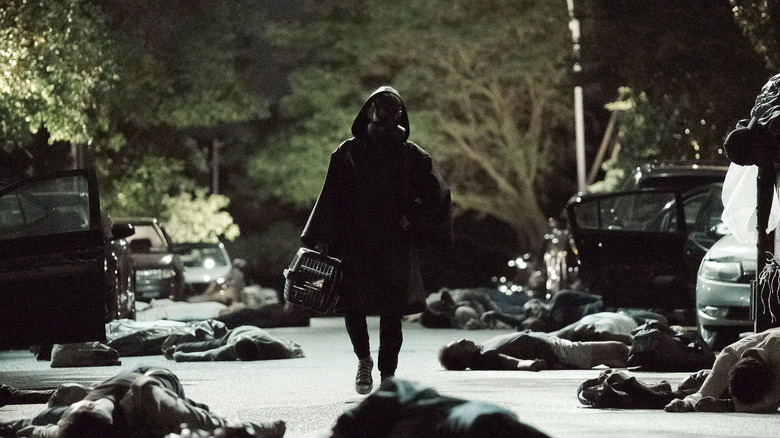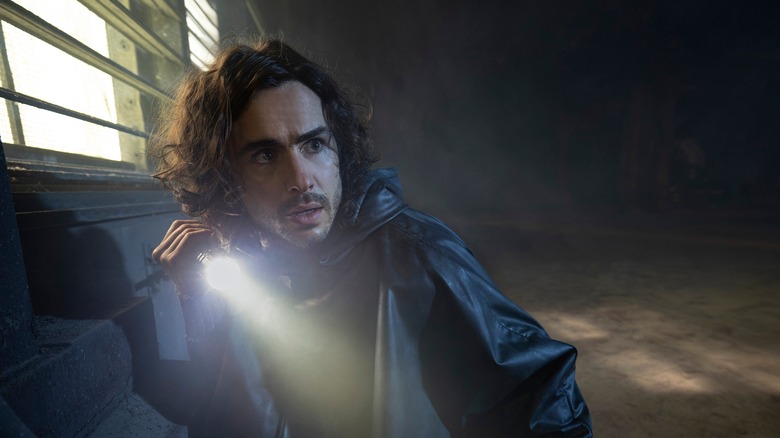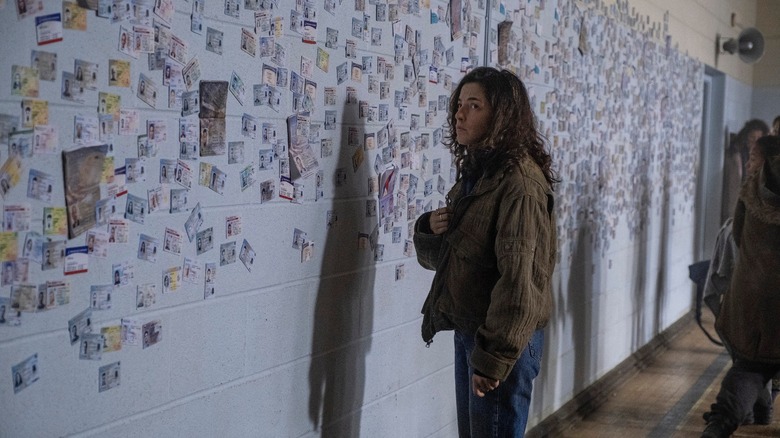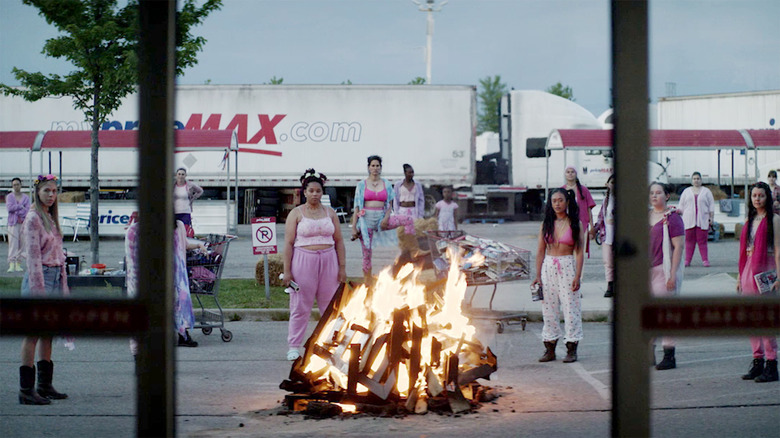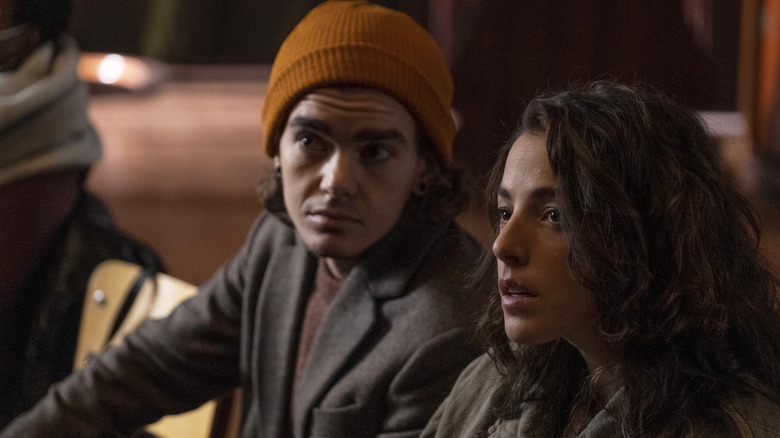Y: The Last Man Composer Herdis Stefansdottir On Writing Music For The End Of The World [Interview]
"Y: The Last Man" is a big show, but for composer Herdís Stefánsdóttir, her experience couldn't have been more intimate. "I was definitely not thinking on a big global scale," she told us. "I was in my little micro universe in Iceland, alone in my studio with a candlelight. Not really thinking outside of that. I'm diving into the internal story." The external story, based on the beloved Vertigo comic book series, shows what happens most of the living beings with Y chromosomes on the planet suddenly die.
Fittingly, the score is haunting. Four years ago, Stefánsdóttir left New York University with an M.A. degree in film scoring. Around that time, she interned for the late great Jóhann Jóhannsson while he worked on "Arrival." In the years since, she made scores for HBO's "We're Here" and "The Sun Is Also A Star." The composer recently finished her work on "Y: The Last Man," which she told us about in a recent interview about the show and her approach to music.
"It's super chaotic. It's dark, it's gnarly and intense."
How's recording in Iceland? Does it inspire you?
I think if it does, it's probably some kind of subconscious inspiration. I have a studio in an industrial area by the sea and I have a view over the ocean and mountains. It's kind of ridiculous. It's like a million-dollar view in some random room over there. I think having that view definitely gives some kind of energy.
That sounds peaceful.
It's not very peaceful because if you know the weather in Iceland, it's extremely intense. When it's windy, it just blows so much, so sometimes the ocean is going insane. That's why I feel like sometimes it's more energy than peaceful by the lake situation.
When you started working on the score there, how did you create the themes for the show?
It just happened. There are so many themes, first of all, so they kind of happened one after the other. But the initial idea came pretty early on and it was cool. Because it's an apocalyptic world, there's a dystopian world, it's not the world we live in but it still is. It could quite possibly happen. We are kind of experiencing our own kind of virus that is affecting us.
How the TV series is shot, it's in a very realistic way. It's more dark and grungy and realistic. When I was thinking initially about the theme and the sound of the world, I didn't really go into the sci-fi zone or futuristic or something that was totally weird or unfamiliar. I felt that it was a world like ours that is somehow close and organic and familiar.
How the first theme came about, I didn't have all the script, so I didn't know the whole story of "Y: The Last Man" when I started. I read a few of the first episodes, a part of the graphic novel, and then I'd seen the first couple of episodes. But just to start, because sometimes starting a big project like this, like a TV series, it's very big, it's very expensive and can be a little bit overwhelming to be like, "Oh my God, what is the sound of this world? What is the main theme?" so I started a little bit smaller. I just started at the event of the apocalypse, basically when this virus strikes and all Y chromosome living beings drop dead.
It's super chaotic. It's dark, it's gnarly and intense. It happens in the first episode of the series, and I wanted to capture that moment. I was thinking about what it meant to experience a horribly tragic event like that. So I wrote the first theme that was completely based on the female voice. It's like, "What is the remaining sound in this world?" It's like clutter. It's a scream. It's like a primal scream of all the surviving beings.
The first theme I wrote, I called "Requiem." I wrote it as a tribute to all the ones that had died, based on the female voice. That's the base of the theme.
"She did things that I would never have thought of..."
You recorded female voices from a distance, right?
Yeah. I went up north to a small town, Akureyri, which is actually the second biggest city in Iceland but it's a tiny little town in the north of Iceland. I recorded 10 female singers.
Who were they?
It's a professional choir from the north. They're really good and super creative. I'd only written this one idea of "Requiem" and I started to write some chords and tonality, but it was very early in the process. I wrote out some very bizarre sheet music, just telling them to talk to each other in alien speech and just see what would happen.
It was more like sound experimenting, and I got some super cool and weird textures and sounds out of that. I used that material in a big part of the score. I sampled it and processed and developed it. That became the foundation. I think the ideas normally come when I'm focused and working on them. It's normally not in the night when I'm just lazy eating pizza and watching Netflix. I'm not really focusing on work.
How else did you experiment with the score?
I think what essentially became for me the most interesting part of doing the score is that when I started writing, I just pulled up the picture, like a lot of film composers do, and started writing to picture. The music supervisor, Sue Jacob, called me and she was like, "What are you doing? Why are you scoring the show?" I was like "What do you mean?" She was like, "What is the story? What are the themes? What is the sound? What is the world? What are you telling us? You got to find that." And I was like, "Okay, sh*t. I'm just going to throw away the picture, read the scripts and try to invent and interpret the story on my own." So I started exploring and writing the music and writing the themes and experimenting with sounds without even touching the picture. It evolved into me writing the entire score without the picture, just purely described without seeing the episodes.
Had you done that before?
No, not on such a big scale.
What did you think when you finally heard the score in the show then?
It worked out really good, which I don't know if it was me being lucky that it worked out, or that it just somehow was a right match because I guess it can go either way when you don't write to picture. I think partly the reason why it worked so well was because I had an amazing music editor. Suzana Peric is a very experienced woman in the industry. She's music edited a lot of Morricone films, and she's a really, really amazing editor.
I wrote the themes and then we had conversations about what I was thinking, and then she basically edited my music to picture. She did things that I would never have thought of, which was very inspiring for me because of how she edited and used the music that I'd written.
"I just want silence when I come home."
Is there a strong sense of community among composers in Iceland?
I wouldn't say the film composing community is super big because we're not that many Icelanders that are doing it, but we are a few and we all know each other. But the music community is tight. I mostly just work with my friends. There's so many excellent musicians in Iceland. I don't know how that happened, but you don't have to go anywhere. You can just do everything here.
What got you into composing?
I was really into composers. I was really into composers like [Krzysztof] Penderecki, [Olivier] Messiaen, the Polish minimalists. I was into Béla Bartók, playing all of his stuff on the piano. Loved Arvo Pärt. I think those are some of the composers that I was like, "It would be nice to learn how to write out sheet music and write for instruments."
Do you listen to other music when you're working on a score?
I don't. I think the only times I turn something on is when I'm really like, "Nothing is happening. Sh*t, I've got to listen to something." I only use it when I'm having a not great moment, but normally when I'm in the zone and when I'm on fire, I barely do. It's crazy to be a musician because sometimes I realize that I'm barely listening to music, and I've no idea what's going on in music either. We're just always writing, and then I just want silence when I come home.
What were some moments you felt really in the zone on "Y: The Last Man"?
I don't know what it was about this project. Maybe I just got really lucky. I don't think it's ever come as naturally on any project I worked on before. I think maybe partly it was because I had trust and I had support from the music editor and music supervisor, a lot of trust from Eliza Clark, the showrunner. I felt safe and nurtured in the whole process. Because I wasn't writing to picture, I didn't stop myself. Just all the ideas that came to me, I just allowed myself to do them and sent them away, whether they'd be used or not.
I was totally left alone in the composing process. I would write a bunch of music, send it to the music editor. She would edit it to picture. I would just talk to Eliza, see and assume her face. I was like, "Okay, she likes this. Okay, no she doesn't like this," which was an interesting process. Eliza was super open and really nice to work with.
"I play piano like a nine-year-old."
Any ideas that didn't work?
Nothing except for one sound. It was really funny. I filled wine glasses with water, recorded them through pedals and re-amped them in my studio. And then there was a filter sweep on one of the pedals. When I swiped on the filter, there was this weird sound that formed by some accident.
Because Susana had my music to edit it, there was one piece that I wrote on the soundtrack called "Apocalypse" that was used all over the show. At the end of this piece, there was this super annoying sound that Eliza completely hated. It ended up with Eliza being like a truffle pig. Just every time that sound came, she was like, "No."
That was it. It was just this one sound that somehow, I think almost everything that I wrote just kind of worked, which must be some miracle. I don't think that happens often in film scoring.
I thought the wine glasses were an interesting dimension to add to the voice and how the sound kind of breaks. I think the network, which was very hilarious, they thought it was a theremin. They kept asking about the theremin and if we could take the theremin out of the show. They thought it was too weird and experimental. That sound is actually all over the show. So they decided to keep it in, even though they were like, "What the f*ck is this?" [Laughs]
[Laughs] Does that happen a lot? You'll think about a glass of water and wonder, what kind of music would that make?
Yeah. Especially in COVID, you're just in your own studio. I think for me, I really like working with recorded sounds. I don't use a lot of samples or built-in libraries and plugins. I like being creative with whatever stuff that I can record. I'm a very limited instrument player, so I have to be creative with something that is sometimes not instruments.
How do you find yourself limited instrumentally?
I'm just that. I'm mediocre. I play piano like a nine-year-old. I never finished my studies, was lazy in school. I get by, but I'm not the kind of classic composer that is a good instrument player. That's just not my skill.
"I think that became my strength, that is working and creating sounds."
Some composers have told me that can be a good thing, because maybe you'll have a different approach to music than more traditionally trained composers.
I totally agree, even though I sometimes wish that I could play the violin or cello. No, it would be super convenient as a film composer. I think what kind of became my thing is that I went a lot into sound. What makes me sometimes excited in writing music is creating sounds and planning something. Sounds make me excited, maybe sometimes more than the notes, even though it's always a combination. I think that became my strength, that is working and creating sounds.
What other unconventional sounds or instruments did you try for the show?
Just for "Y: The Last Man," there was another really cool instrument that I recorded. There's only three of those that exist in the world, and it's an Icelandic friend of mine that built it. It's called the magnetic harp. It's an electroacoustic harp, which merges the worlds of something that is electronic and acoustic and creates this magnetic resonance. That sound became one of the main foundations for one of the big themes in the show. It doesn't sound like a harp at all. It sounds like electrical magnetic resonance. It's hard to explain. It's a very special sound. It's going to come probably after episode six. You will start to see that sound sneak in more and develop as a theme.
